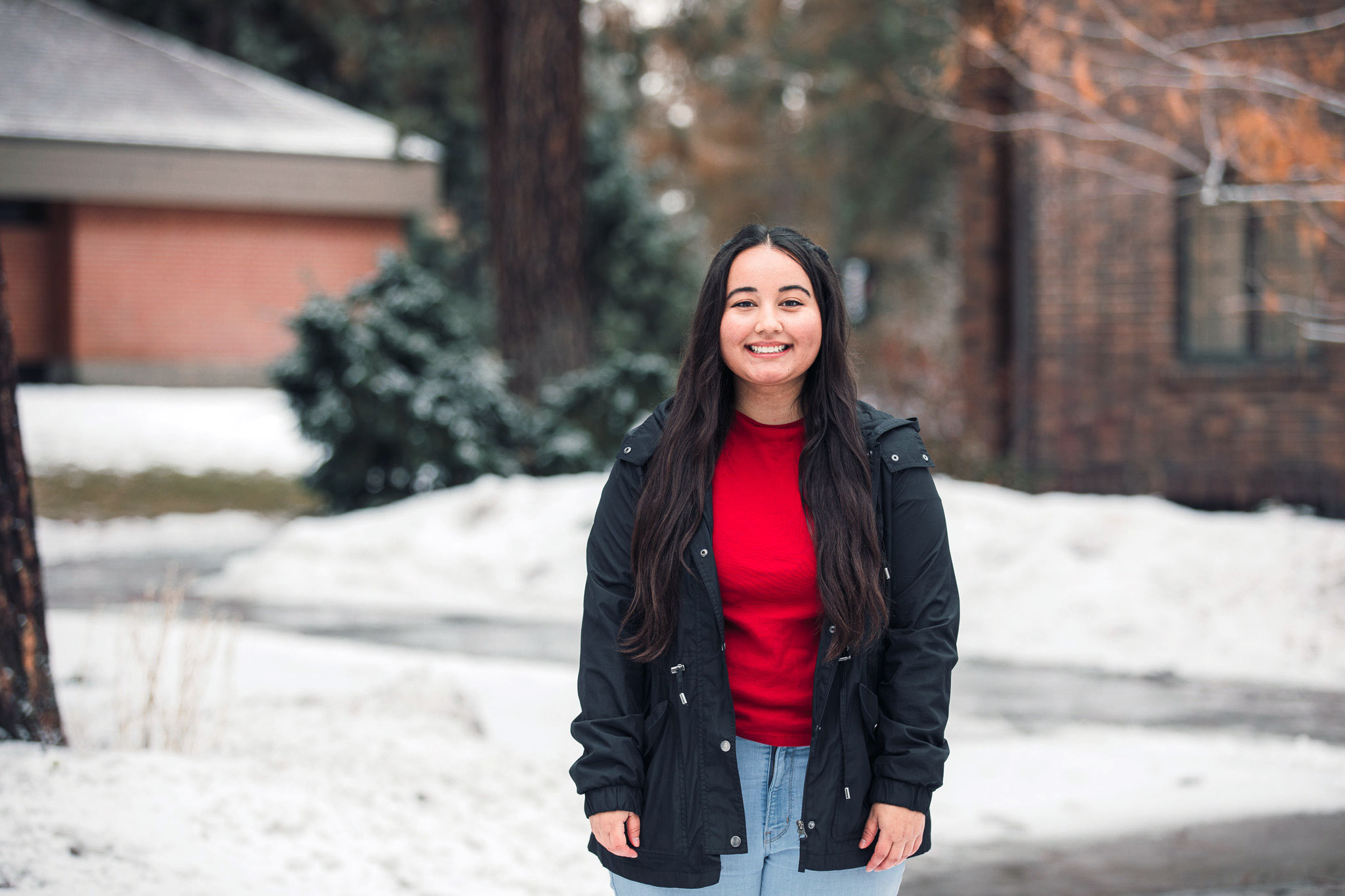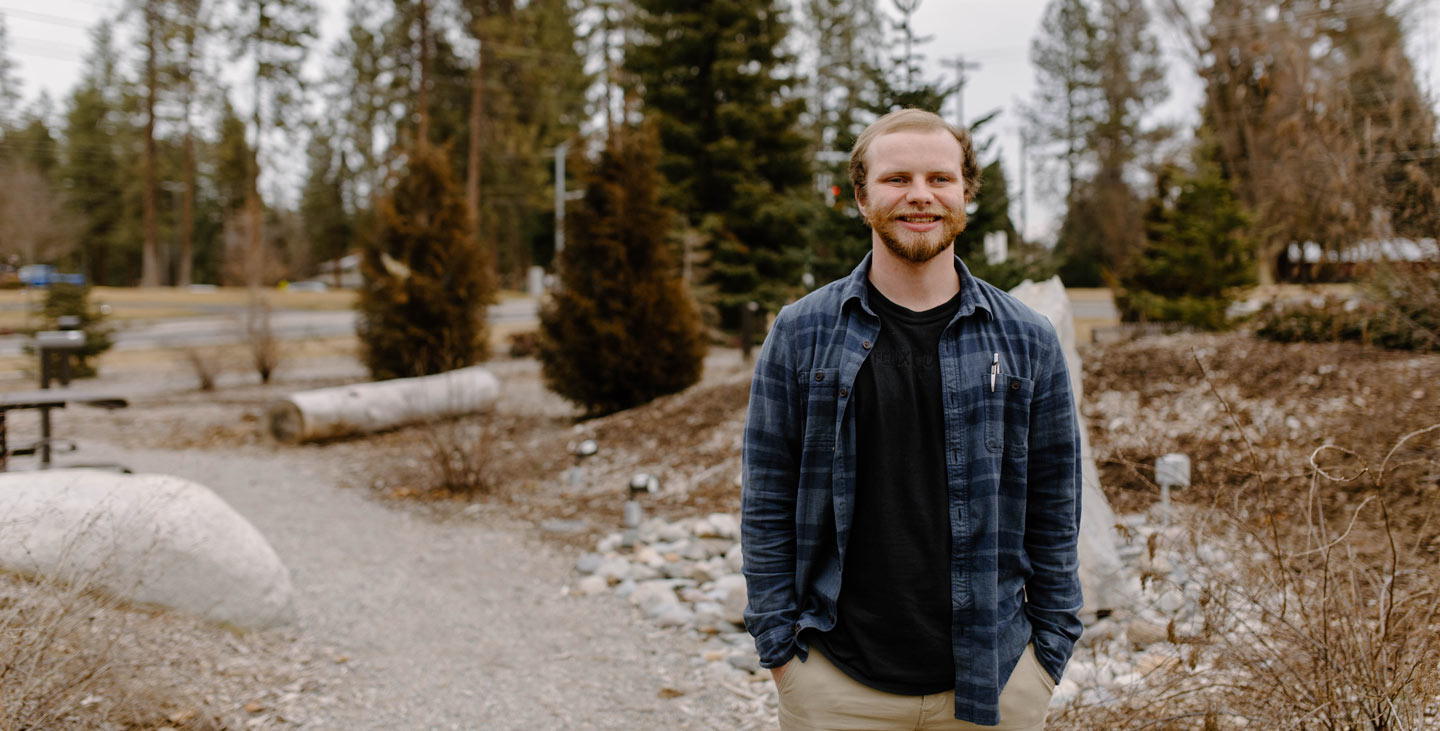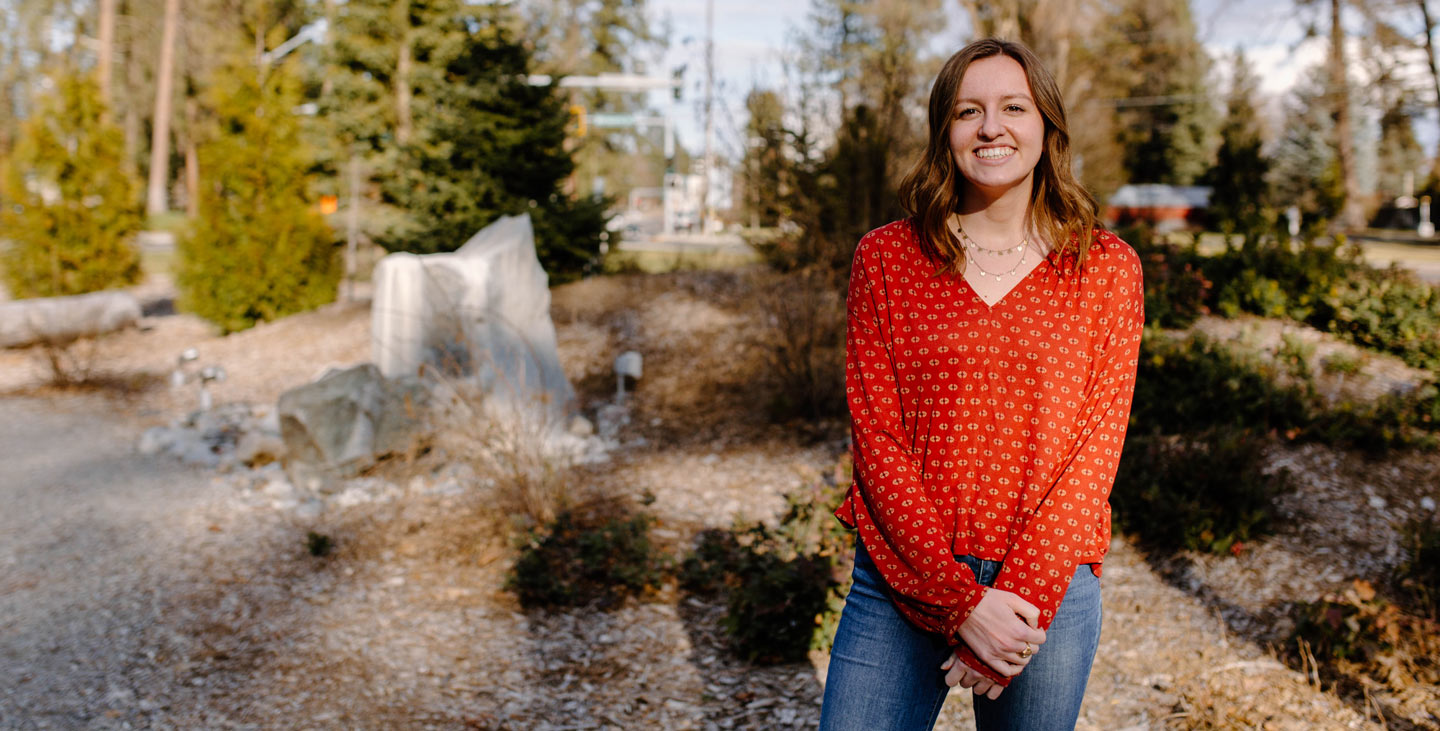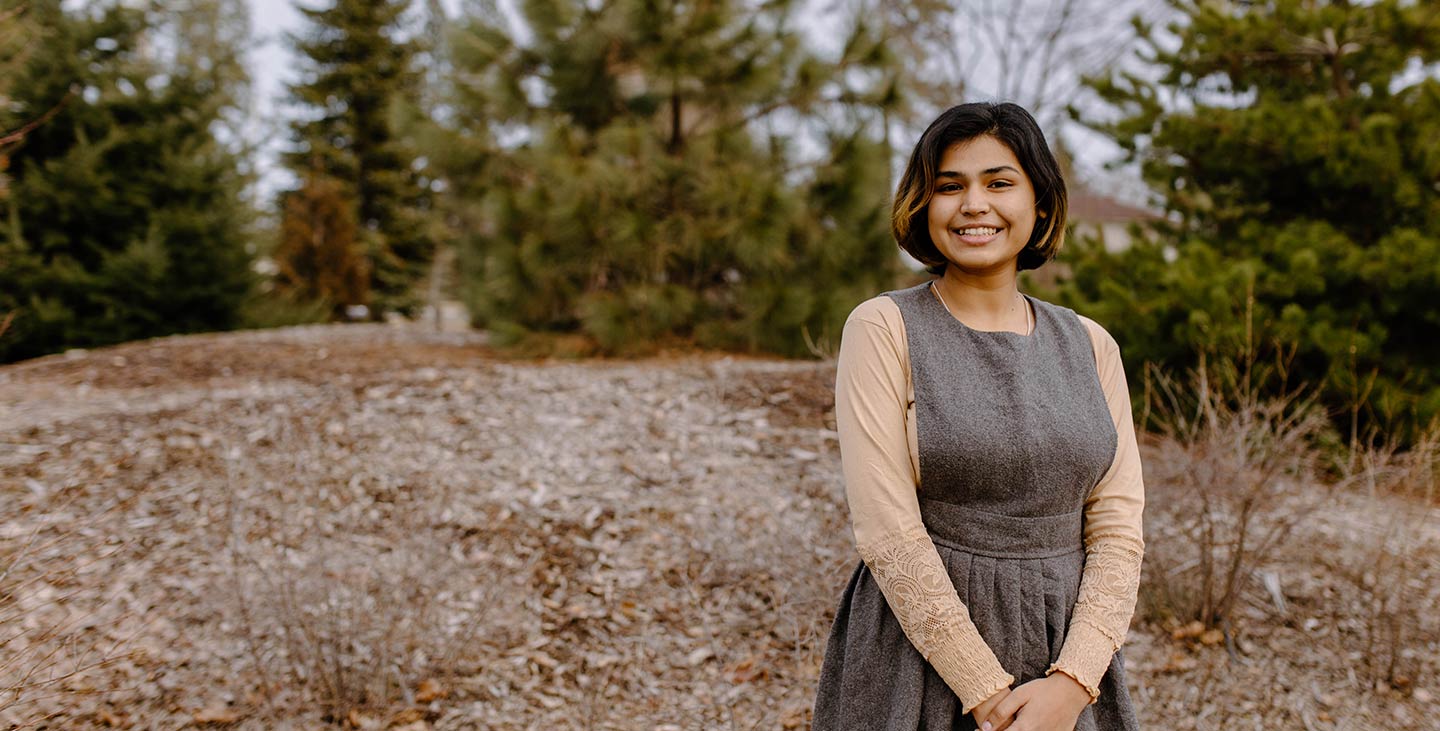English
 Elisa Vigil '25
Elisa Vigil '25
Why did you decide to study English?
I've known since I was a kid that I wanted to write, but becoming an English major was something that snuck up on me. My first semester, I took Multicultural Literature on a whim and was blown away by the pieces I got to read. I decided to take another English course. Then another. Eventually, I applied to work at the writing center, and soon after I became a reader for our literary journal. I started to really love school, and that's when I knew I'd landed on something special.
What classes have been your favorite so far, and why?
Critical Strategies is a course most English majors have to take. The name makes it sound like the blandest class ever, but in reality it's really weird and really wonderful. Creative Non-Fiction was also a game-changer. I started that class with almost no previous experience and emerged with a new passion and some of the best pieces I'd written in my life.
Tell us about a unique experience or project you've worked on for your major.
Working at the writing center has been important to me. I get to help students sharpen their composition skills and show them that they really are good writers. Sometimes they share their poetry with me, or an in-depth lab report, and it's amazing either way. Writing is very personal, and it's always meaningful to have a student trust me enough to show me something they've created.
What advice would you give to someone thinking about majoring in English?
Do it. The world is always going to need strong storytellers. A lot of students shy away from English, even if they love to read and write, because they've heard it's a useless degree. The truth is that success after college has less to do with what major you pick, and more to do with how you're using your time here to grow and prepare. You need to pick something that you love first, and then squeeze it for all its worth.
What's your dream job?
There are so many things I want to do. I want to write for The New Yorker, but I also love music and could see myself going into songwriting or song production. I also think it'd be cool to be a professor one day. Life is long, and an English degree will give you the transferable skills you need to pursue a host of passions.
Who is someone who has made a difference for you at Whitworth?
Ayaka Dohi, who serves as the director of Student Diversity, Equity & Inclusion, is someone who lives out what she believes about justice and kindness. She inspires me every day to be a better part of my community, and I see what she does for me and for the other students of color on campus. I admire her, and I want to be like her.
How would you describe Whitworth?
Whitworth is the ultimate place to build your résumé. There is a wealth of internships, volunteer opportunities, leadership positions and jobs that are going to be harder to come by at a bigger school (especially as a first-year). At large, Division I universities, you might be one in a hundred students competing for a few jobs and a little face time with your professors. At Whitworth, however, you can easily gain meaningful experiences and connect with your instructors. This comes in clutch when you're applying for graduate school.
 Aaron Slape '22
Aaron Slape '22
Why did you decide to study English?
I knew I wanted to study English coming into Whitworth for two reasons. The first was simply that I want to teach reading and writing to middle school and/or high school students one day. The power to analyze texts thoughtfully and communicate through the written word is one that everybody needs and deserves a shot at. The second reason is that I really enjoy stories and the power of story. The stories that we tell ourselves reflect the lives we often live, and I think it's important to be keen of that.
What are some of your favorite classes so far?
I've really enjoyed American Literature After 1865, Intro to Critical Theory, and Creative Writing. All of these classes have been unique and wonderful experiences during my time at Whitworth. Not only that, but in each of them I have learned valuable skills that will help me be a successful educator one day.
Tell us about a unique experience you've had or project you've worked on for your major.
When I took Reading in Action the fall of my freshman year, we had the opportunity to do some really sweet archival research through Whitworth's databases on the university's history of handling issues of racism and prejudice through the years. Our group not only learned a lot about Whitworth but also everything from designing a website to doing a live interview with an alum.
What advice would you give to someone thinking about majoring in English?
Being an English major is a great path for many different job opportunities. If you're on the fence about it, I would say take a class that fulfills a general education requirement but also provides a good scope of what you'd be getting into like one of the literature surveys or a creative writing class. Taking Writing I or II probably won't give you a good idea of what the English department has to offer. It's a rich community of committed and often overqualified professors. They all want to be your friend and push you to succeed. There are also plenty of group events and opportunities for internships as well. Your classes are small, so you really get to know everyone in them and make friends. All that to say it's a lovely time.
What's your dream job?
My dream job is to teach early high schoolers in a medium to smaller sized school where I can be a leader in the community and a mentor for kids. English plays a huge role in that dream as it's something I am dearly passionate about. To be able to share my love of English with students and equip them for success in their further education or job experiences is something I look forward to. My faith also plays a central role in this calling.
Who has been an important connection for you at Whitworth, and why?
There are a few people I could talk about, but I'd have to say my advisor Dr. Bert Emerson. He is always seeking to enrich my life and set me up for success in our conversations, and it's not just because it's a part of his job. I can tell he cares deeply for me, and I look to him a lot with gratitude. He is always able to help me navigate my aspirations and make decisions that prove fruitful in the long term. He's always got wisdom to share and also encouraged me when I've needed it most.
Why did you choose to attend Whitworth?
One of the big reasons was that I knew Whitworth was able to provide such great and abundant opportunities and knowledge for a good price. I don't come from a lot of money, so financial aid is something I rely on heavily. Whitworth was able to offer so much more than other private schools in the area and so it just made sense on paper. I just also really enjoy Spokane and want to stay after I graduate.
How would you describe Whitworth?
My word that I often use to describe Whitworth is "relational." All the people and groups that I've been involved with on campus – whether it's my job, friendships or department – all put relationships at the center. It's hard to come across someone who doesn't care for your well-being. There is a great sense of neighborliness here that I don't think many other universities can claim honestly.
 Annika Bjornson '22
Annika Bjornson '22
Why did you decide to study English?
I value the skills that the English major instills in students: critical thinking, analysis, engagement, argumentation, creativity, communication and empathy. Not only are these highly marketable, but they apply to so many areas of life. The English department is incredibly strong and spunky, with professors who have expertise in diverse fields and students who go on to do so many different things. Also: Good writing is power!
What are some of your favorite classes so far?
I took Laurie Lamon's creative writing class during the spring of 2020, and throughout the semester, we brought in new pieces of work every week to build up to our final portfolio in May. It was so interesting to see how our creative pieces transformed through the weeks of moving home, learning online, processing the pandemic, and reacting to current events as they happened. Despite the challenges of Zoom, this online space become a source of support for many of us, and our portfolio was an outlet through which to understand what was happening and to think critically.
Tell us about a unique experience you've had or project you've worked on for your major.
In my first semester at Whitworth, I took Bert Emerson's Reading in Action class where we read American novels, discussed their significance, and culminated the semester's learning with a project where we worked with primary source documents here at the Whitworth library's archives. From those documents, we created arguments about American democracy and produced a final product that could become incorporated into the archives to teach future readers about the primary sources. It was exciting to be involved in understanding and telling Whitworth's history as a first-year student.
What advice would you give to someone thinking about majoring in English?
When trying to decide whether this major will provide the right opportunities for you after college, I would avoid looking online. You will find all kinds of articles arguing for or against studying English, and it is usually not helpful. Instead, I would advise talking to people. You could chat with your college counselor, reach out to graduate schools, talk to people in workplaces that appeal to you, or get in contact with someone in our department. The professors and students here would be so happy to chat with you about what students have gone on to do and how they have applied their skills to their vocational path.
What's your dream job?
Here's the thing about English majors: Our path is less straight, so we often have dozens of career paths that excite us. A few of mine include nonprofit immigration lawyer, diplomat, case manager, NPR journalist and professor.
Who has been an important connection for you at Whitworth, and why?
My English professor and advisor, Bert Emerson, has been an important mentor to me. He believes in me and puts in the extra effort to provide me with opportunities, whether by nudging me toward a study abroad until I finally realize that I'm interested in it, or by emailing me during Christmas Break with a suggested career path. He has really embodied the caring Whitworth community and the importance of experiences in the liberal arts.
What's something that surprised you or might surprise other students about the English major?
You might not consider Victorian poetry or Irish postcolonial literature very interesting, but just wait. Your professors will somehow make it feel so exciting that you will find yourself with more niche interests than ever before.
 Sakina Vidyarthi '23
Sakina Vidyarthi '23
Why did you decide to study English?
My favorite place to hang around in high school was the library; I was fascinated by the world I could escape to through books. However, the books weren't enough to pull me to the area of English; instead, it was the poems I started writing in 10th grade and the languages I got interested in learning around eighth grade. The way words functioned to incite an emotion within the reader, regardless of their language, fascinated me.
What are some of your favorite classes so far?
Being an aspiring writer, I loved Creative Writing with Jake Andrews because I got to write almost every week, which helped my writer's block a lot. Another favorite one was Post-Colonial British Literature with Casey Andrews because the course material was diverse and intriguing. The best thing about the course was that we weren't just reading novels (which someone would expect from an upper division literature class) but also poems, plays, short stories, films, and at one point we were also listening to course-related songs like Irish folk.
What advice would you give to someone thinking about majoring in English?
"Do not judge the book by its cover!" An English major is not just about Shakespeare, tweed jackets and writing a book by graduation – well, in your extended relative's mind, maybe. In reality, it's a world of professors with clever humor, books you never thought you would read but now can't stop talking about, discussing texts, films and art like you're a character from a Jane Austen novel, and of course, occasional cookies!
What's your dream job?
As much as I'd love to have my name on a book, I want a job where I'm writing and reading regularly. After taking few English classes at Whitworth, I have realized I like discussing the texts I read. I can engage well with the works and provide critique on them. Thus, my dream job would be doing that for a living – working as an editor for a publishing house and later a book critic.
Who has been an important connection for you at Whitworth, and why?
I believe the faculty members are one of the many strengths of Whitworth because they are very helpful and give the best advice. I came to Whitworth as an English minor, but after taking a few English classes I wanted to switch to an English major while being a computer science major as well. I reached out to my English professor and now advisor, Dr. Jake Andrews, who helped me map out my four-year plan through which I can balance the two polar-opposite majors and graduate on time. He helped me tailor my class schedule according to where I would like to go after my graduation while completing all my required credits. It has helped me a lot in navigating through college without panicking due to fear of bad decisions.
What's something that surprised you or might surprise other students about the English major?
Coming from India, my experience with English classes had been very different – mainly consisting of reading assigned texts and writing paragraphs about it that the professors didn't care about. However, at Whitworth I get to engage in discussions where we unravel something interesting and the professors pay attention to students and encourage us to explore more. In India, I'd never had teachers who were so approachable and friendly. In Whitworth's English department, at one point the professors might be engaged in an intense literary discussion, and at another they might be talking about why the villain was actually the anti-hero of the movie they watched last night.
Why did you choose to attend Whitworth?
Choosing a college as an international student requires considering a lot of factors including an inclusive community and a place where the faculty cares about their students' education and thoughts; Whitworth satisfied those requirements.